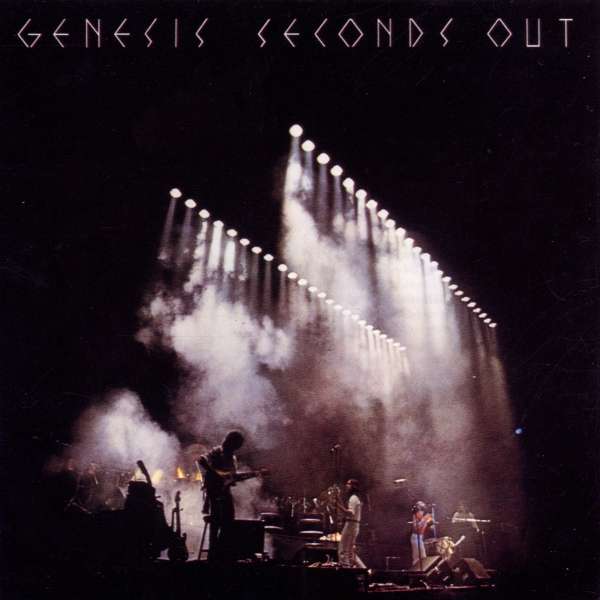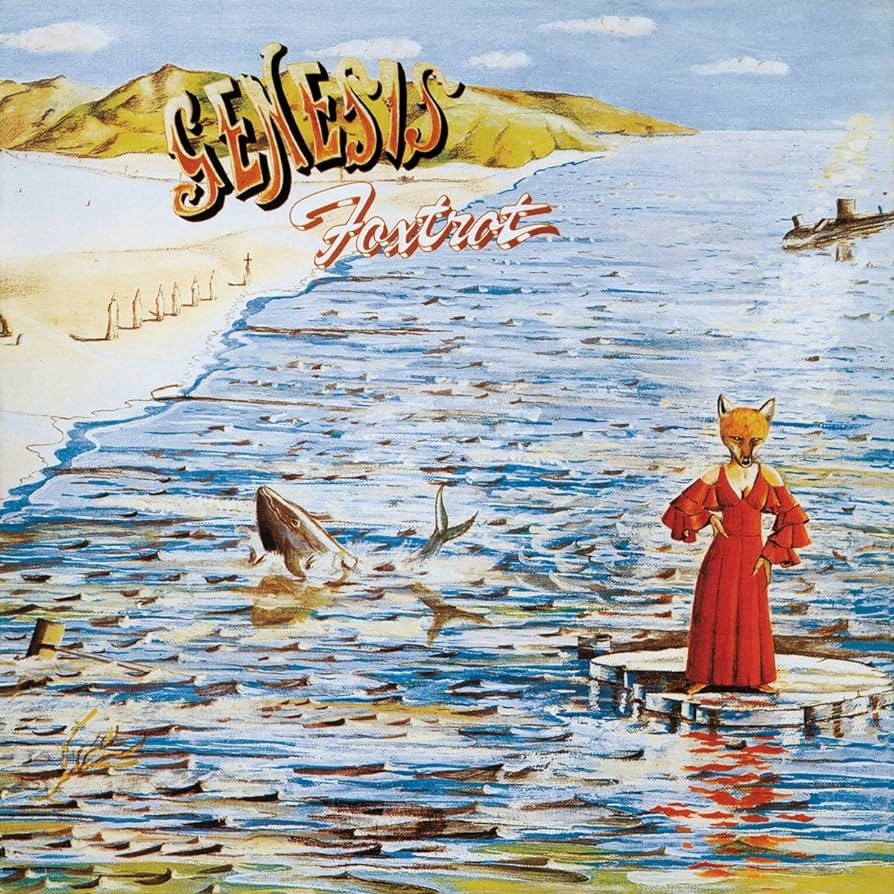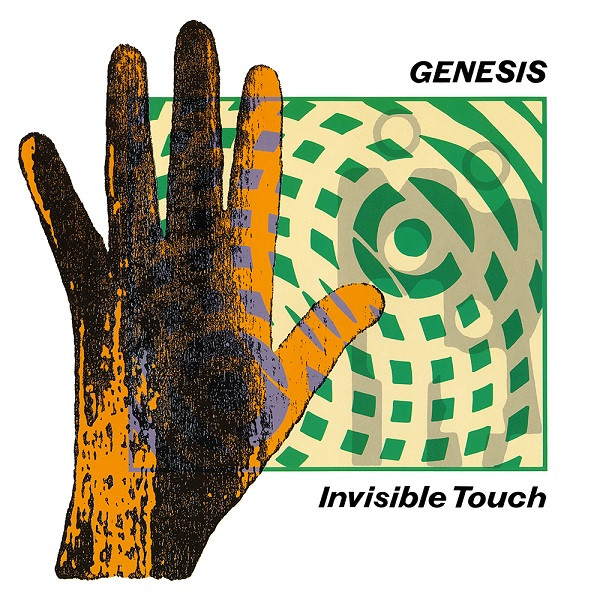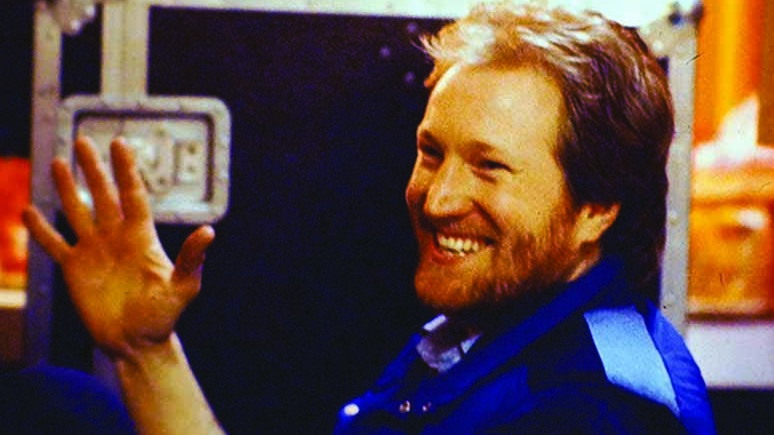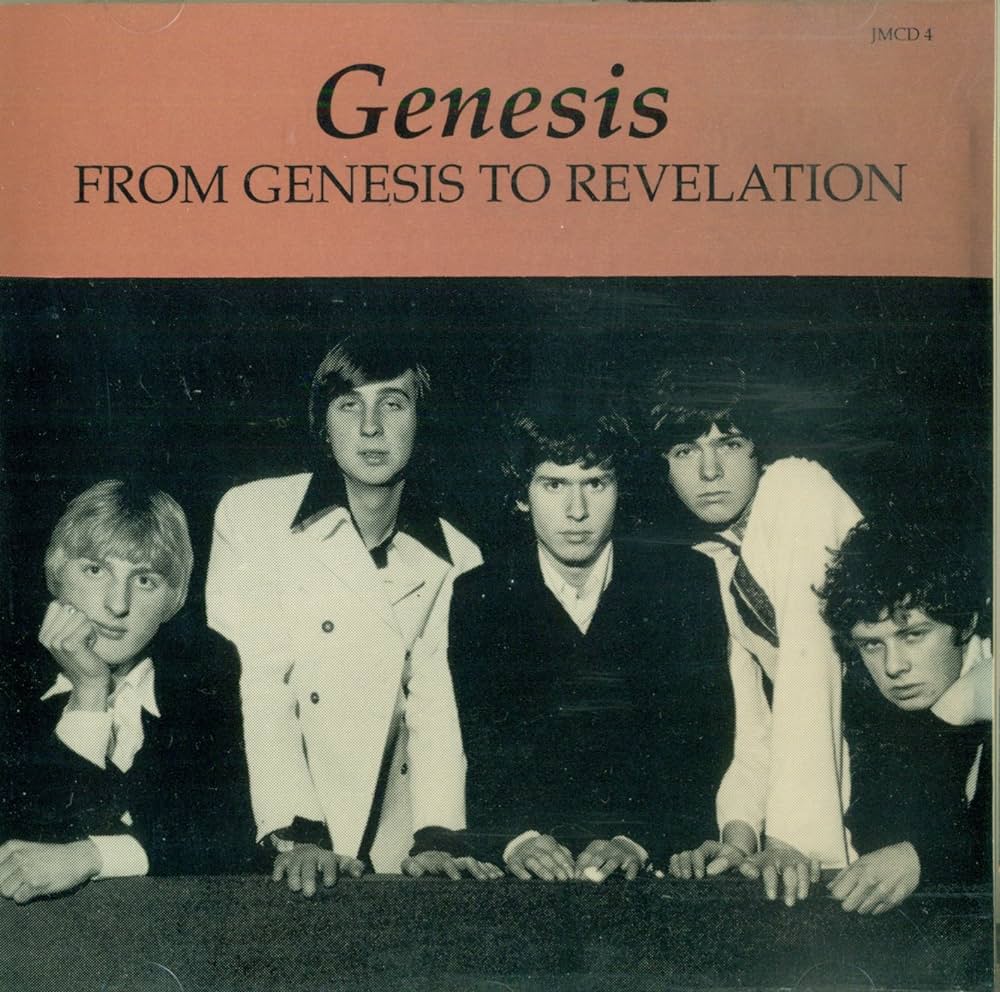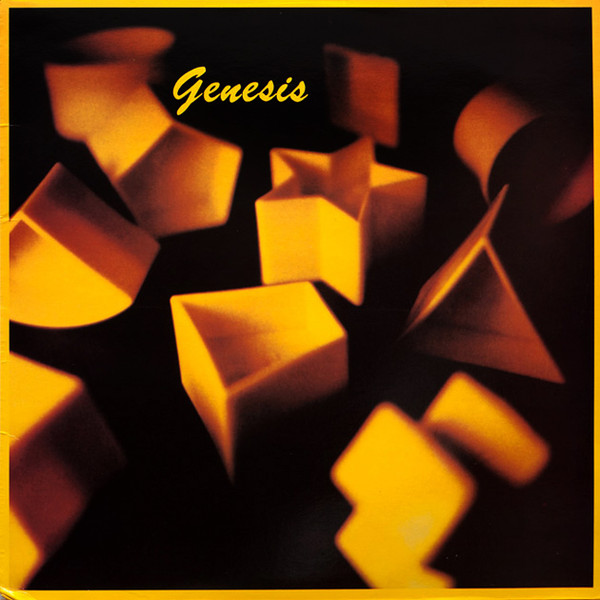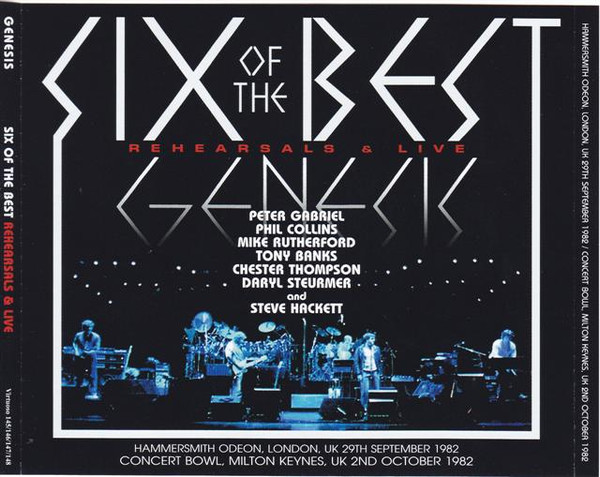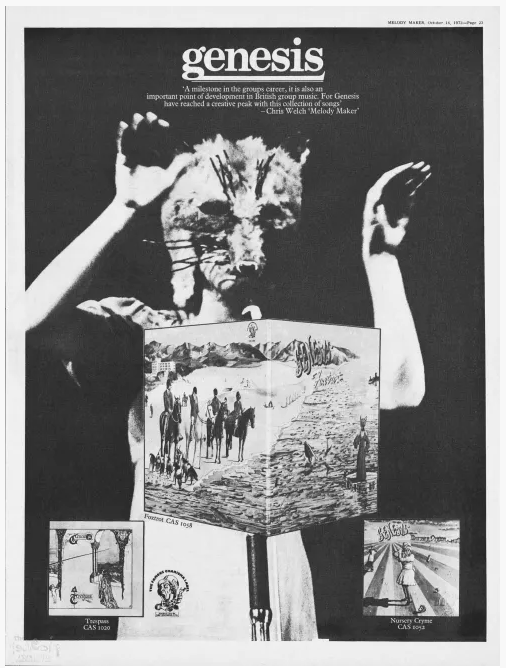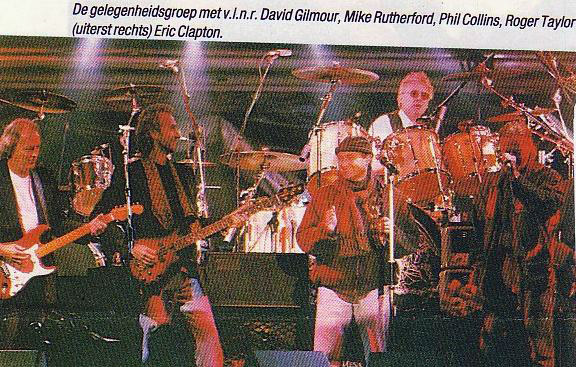Genesis’s second album, Trespass, marked a turning point in their musical journey. Released in October 1970 on the Charisma label (and on ABC Records in the US), the album showcased a band finding its identity, blending folk, rock, and soul in ways that set them apart from their contemporaries. Recorded at Trident Studios in London under the guidance of producer John Anthony, Trespass was a bold step forward for Genesis, a band on the brink of discovering their iconic sound.
Continue reading “Trespass (1970) – Genesis”Seconds Out (1977) – Genesis
Genesis released their double live album Seconds Out in October 1977, capturing the band’s performance during the Wind & Wuthering tour. Recorded mainly at the Palais des Sports in Paris in June 1977, with one track from the Pavillon de Paris in June 1976, the album showcases Genesis at a pivotal moment in their evolution.
Continue reading “Seconds Out (1977) – Genesis”Foxtrot (1972) – Genesis
It’s the year 1972. Genesis had released Nursery Cryme the year before and had played their first show overseas in Brussels in early 1972. Several shows in Europe followed and after their return to the UK, they began writing their next album Foxtrot, which, for many fans, would become their ‘progressive’ high point.
Continue reading “Foxtrot (1972) – Genesis”Invisible Touch (1986) – Genesis
Phil Collins: ‘The mid-1980s was the biggest we ever got.’1
By the mid-1980s, there were longer gaps between Genesis albums. Phil Collins had launched his solo career at the start of the decade, and after their previous Genesis album, Mike Rutherford formed the hugely successful Mike + The Mechanics with vocalists Paul Carrack and Paul Young. Tony Banks, who had been releasing solo albums since 1979, remained the only member of the trio without significant chart success.
In 1985, Genesis reconvened at their studio, The Farm, with producer Hugh Padgham to begin work on a new album. The result was Invisible Touch, a bold, vibrant collection of songs released in 1986. Of the album’s eight tracks, five became major hit singles: “Tonight, Tonight, Tonight,” “Land of Confusion,” “In Too Deep,” “Throwing It All Away,” and the title track, “Invisible Touch.”
Invisible Touch
The lead single “Invisible Touch” is often viewed by die-hard progressive rock fans as a commercial betrayal – a far cry from Genesis’ roots. Yet the song, like all tracks on the album, was born from the band’s collaborative jam sessions. Engineer Paul Gomersall, who worked alongside Padgham, described their creative process:
‘Mike would come up with some sort of wacky drum loop. He’d bring his drum machine in, or Phil would, and they’d work around that. Mike is very experimental. I think he sees himself as more like a Brian Eno sort of person who makes interesting sounds and rhythms. Tony’s stuff was more chordal. Half the sound of Genesis is the chords that Tony comes up with.’2
“Invisible Touch” emerged when Mike played a guitar riff with an echo effect, prompting Phil to sing the now-iconic line, “She seems to have an invisible touch, yeah!” Phil penned the lyrics about being irresistibly drawn to someone mysterious and overpowering, even when it’s not good for you.
The song, like the rest of the album, features electronic drum sounds typical of ’80s pop. The rhythm was inspired by Sheila E.’s and Prince’s “The Glamorous Life” (1985). With Mike’s bassline, Tony’s keyboard solo, and a key change in the outro, “Invisible Touch” becomes a dynamic, infectious pop anthem.
Phil Collins: ‘Invisible Touch is my favourite Genesis song.’3
Live, the band always performed the song in a lower key to reduce strain on Phil’s voice. Still, he turned it into a crowd-pleasing singalong. Mike Rutherford also named it one of his live favourites, calling it ‘a wonderful song: upbeat, fun to play, always a strong moment in any gig.’4
Though a commercial triumph (Genesis’ only US No. 1 single), for some fans it marked a sellout. It even earned a mention in American Psycho, where Patrick Bateman dubs it the band’s ‘undisputed masterpiece.’
Tonight, Tonight, Tonight
Described by music journalist Chris Welch as the band’s ‘most memorable pop ballad,’5 “Tonight, Tonight, Tonight” features a haunting electronic motif and lyrics that are both abstract and direct.
The album version runs over nine minutes and showcases the band’s classic style. Originally titled “Monkey/Zulu,” the song grew from a jam session led by Tony Banks, who improvised the extended instrumental section, complete with strange, evocative effects. Phil’s stark lyrics, partly improvised, deal with drug addiction.
Mike Rutherford: ‘It’s more of the old-style Genesis in that it covers a lot of ground musically and has a fairly involved instrumental passage in the middle. We’ve done songs like this from the word go. The initial bit came from an improvised jam and the song and solo part in the middle were obvious from a longer section when Tony was just improvising sound over a rhythm being played by Phil and I and he just assembled a composed solo part.‘6
He added that Tony is ‘the most adventurous‘7 in terms of structure, always pushing the band to break from the traditional verse-chorus format.
Land of Confusion
Mike Rutherford wrote the lyrics for this rare political track, tackling international tensions. ‘It’s a political song about the mess we landed in. I’ve always shielded away from doing what I call a preachy song, a protest song, but it seemed to work. Maybe because the music was quite angry it made it work.’8
Musically, it was a group effort.
The Spitting Image Video
“Land of Confusion” became iconic thanks to its music video, featuring grotesque puppets from the British satirical TV show Spitting Image. Genesis, along with caricatures of politicians like Reagan, Thatcher, and Brezhnev, appeared in a surreal nightmare sequence.
The idea came when Genesis video director Jim Yukich saw Phil parodied on Spitting Image. On the show, puppet Phil performed a spoof love ballad called “Oh, You Must Be Leaving,” crying throughout.
In the video, Reagan is shown in bed with his wife and a monkey, a nod to his film Bedtime for Bonzo. The clip also features puppets of musicians like Bob Dylan, Tina Turner, and Michael Jackson. It won the band their only Grammy: Best Concept Music Video in 1987.
Tony Banks: ‘What other video can boast having all these stars, like Madonna and Prince?’9
In Too Deep
In 1985, Ray Cooper of Handmade Films (George Harrison’s company) asked Phil to write a song for Mona Lisa starring Bob Hoskins and Cathy Tyson. While touring in Australia, Phil composed the chorus of “In Too Deep.” But since Genesis were about to start working on a new album, he brought the idea to the band.
The result: a warm, elegant pop ballad. Phil’s tender vocals are complemented by Tony’s piano and Mike’s subtle guitar work. Cooper loved it, and the song became a hit in its own right.
Tony later noted the challenge of filming the video, which simply showed the band performing: ‘The most difficult videos for us in many ways were the ones that you didn’t really have anything do. So things like ‘so ‘In Too Deep’ I remember being a bit of a struggle because it’s just a love song. How do you do it? So we just did it with us, almost like a cabaret thing.’10
Anything She Does
Fast-paced and synth-heavy, this track features Tony Banks’ layered brass sounds and Phil’s punchy drums. The lyrics, about tabloid models, inspired the band to cast British comedian Benny Hill as Fred Scuttle in the video.
Phil called Hill himself. Though hesitant to reinforce his “dirty old man” image, Hill agreed if his character never actually got the girls. The video was set backstage at Wembley, with Hill as a doorman keeping out eager women. Phil cherished the signed photo he received afterward.
Domino
The album’s epic track, “Domino,” is split into two contrasting parts: “In the Glow of the Night” and “The Last Domino.” The first is slow and atmospheric; the second faster and rhythmically intense.
Tony Banks wrote the lyrics, capturing loneliness and despair during wartime.
Mike Rutherford: ‘His words are the reason why he’ll never write a hit single.’11
Phil Collins: ‘We were always a group of songwriters who would write 3-, 10- and 20-minute songs. We still write 10-minute songs, like ‘Domino’, but unfortunately, the three-minute songs have gotten better and become hits. I don’t feel we’ve bastardized the way we were, as we still work the same way. Diehard fans will say, ‘Rubbish. ‘The Carpet Crawlers, ‘I Know What I Like’ – that was progressive!’ But I don’t see that. We’d have killed for hit singles back in the early days!‘12
Mike added, ‘Looking back, people forget the show’s an hour and three quarters maybe and the costumes were probably 15 minutes of the whole thing. When we started having hit singles with MTV and videos, a hit single overshadowed the whole album and people started sort of saying ‘You stopped doing long songs.’ We never did, really, every album had a sort of 15-minute-long song on it till the very end. But they were album tracks, so they weren’t on television, they weren’t on the radio, but live they were a big part of the set.’13
Throwing It All Away
Built around a looping guitar riff by Mike, “Throwing It All Away” is another emotional song that plays to Phil’s strengths as a vocalist. Despite its melancholic lyrics, the song feels optimistic and breezy, another showcase of the trio’s songwriting synergy. Mike also penned the lyrics.
It became famous live for its audience call-and-response.
Drummer Chester Thompson called it his favourite to play live: ‘The crazy thing about that is that the full kit only comes in the last bit of the song, it’s mostly just hi-hat and bass drum and then you finally come in towards the end, but I just thought it was such a great feel, I loved playing that song.’14
The music video was composed of footage from the band’s 1986 tour, capturing Genesis in their prime.
The Brazilian
The final track on Invisible Touch is the instrumental “The Brazilian”, a piece filled with off-kilter electric percussion and eerie half-tone steps. It’s undeniably, as music journalist Chris Welch puts it, ‘the strangest and most demanding cut on the album.’ He describes it as ‘a re-affirmation of the band’s faith in its musical past, […] full of spacey sounds like a sea monster, breathing heavily and stomping up the beach.’15
Reception
Music journalist Chris Welch believes that Invisible Touch comes closest to being Genesis’s ‘ultimate album’.16 Biographers Dave Bowler and Bryan Dray agree, writing that it is ‘certainly it was their best album since ‘Wind And Wuthering’‘ and ‘one of the very best albums of the 1980s.’17 . Yet, fan reactions were not unanimously positive. Alan Hewitt, founder of the official Genesis fanzine The Waiting Room, famously remarked that Invisible Touch was ‘the first Genesis album he ever played once and then turned into a frisbee‘.18
Tony Banks, however, defends the album’s diversity and ambition: ‘On ‘Invisible Touch’, you’ve got the ‘Domino’ suite, which is 12 minutes long, and ‘Tonight, Tonight, Tonight’, which is about nine minutes. Both are identifiably Genesis, the sort of thing that no one else does. If you add, say ‘The Brazilian’, which again is like no other group, you’ve got at least 50% of the album. There are songs like ‘Invisible Touch’ and ‘Throwing It All Away’, but we’ve always done those. It’s just that we do them better now. With the songs, say off ‘The Lamb Lies Down’, maybe they’re lyrically more complex, but in terms of the songs themselves – ‘Carpet Crawlers’ or ‘Counting Out Time’ – they’re all attempts at the same kind of things. Even ‘From Genesis to Revelation’ was all short songs, all attempts at writing hit singles. And all failed.‘19
The multi-platinum success of Invisible Touch made it the band’s biggest commercial triumph, both critically and commercially. Tracks like “Invisible Touch,” “Land of Confusion,” and “Tonight, Tonight, Tonight” dominated international charts in 1986 and 1987. In the United States, where chart rankings also factored in radio airplay, even the non-single “Anything She Does” managed to chart. Meanwhile, MTV played the band’s videos in heavy rotation, giving Genesis an added boost in the age of music television.
Tony Banks reflected on this success with some nostalgia: ‘It’s great having hits. I was brought up in the era of hits, in the 60s the next Beatles song coming out was the sort of high point of my existence.’20
Interestingly, Peter Gabriel, who had left Genesis a decade earlier, found himself sharing the spotlight with his former band. “Invisible Touch” was famously knocked off the No. 1 spot by Gabriel’s own hit “Sledgehammer.” His 1986 album So became his most successful release. It was, without a doubt, a remarkable year for both Genesis and its former frontman.
The Invisible Touch Tour
Mike Rutherford looked back on that time, saying: ‘A lot of people came to see us in the 80s and 90s in America because of the hit singles, but I always knew the long songs would grab them. They were songs that were visually were impressive with the vari-lites. Those who came to see us because of the singles and the radio tracks went away with a different impression of us.‘21
The album’s success led to a massive world tour that saw Genesis perform in stadiums and arenas across Europe and North America. The tour also included several dates in Japan — only their second visit to the country — and, for the first time, shows in New Zealand and Australia. It all culminated in a record-breaking run of four consecutive nights at Wembley Stadium in London in 1987.
Phil Collins later recalled: ‘The Wembley shows were very special. It was still the old Wembley; it was football territory. Everything just seemed to peak at that point. I’ve been thinking about the set of the time with ‘Home By The Sea’, where the lights were coming down.’22
Those iconic Wembley concerts were filmed using Sony’s then-cutting-edge High Definition technology and released as a home video, a first for the band.
After wrapping up the tour in 1987, Phil Collins, Mike Rutherford, and Tony Banks returned to their respective solo projects. The band wouldn’t reconvene until 1991 to record what would become their final studio album with Collins, We Can’t Dance.
Sources
Banks, Tony; Collins, Phil; Gabriel, Peter; Hackett, Steve; Rutherford, Mike; Dodd, Philip (2007): Genesis. Chapter & verse. New York: Thomas Dunne Books/St. Martin’s Griffin.
Barnett, Laura, ‘Phil Collins and Mike Rutherford: How we made Invisible Touch’, The Guardian (14 October 2014).
Bowler, Dave; Dray, Bryan (1992): Genesis. A biography. London: Sidgwick & Jackson.
CHESTER THOMPSON FULL INTERVIEW : HOW HE WENT FROM ZAPPA TO DRUMMING WITH GENESIS & PHIL COLLINS.
Genesis – Behind The Track (Land Of Confusion).
Hewitt, Alan, Opening the Musical Box – A Genesis Chronicle. (Firefly Publishing, 2000).
Holm-Hudson, Kevin (2008): Genesis and the lamb lies down on Broadway. Aldershot, England, Burlington, VT: Ashgate.
MIKE RUTHERFORD UNFILTERED: GENESIS GUITARIST/COMPOSER IN CONVERSATION.
PHIL COLLINS: HOW I GOT THE GENESIS AUDIENCES LAUGHING.
Platts, Robin (2007): Genesis. Behind the lines, 1967-2007. Burlington, Ont., Canada: Collectors Guide Pub.
Room, Adrian (1990): An A to Z of British life. Oxford: Oxford University Press.
Rutherford, Mike, The Living Years: The First Genesis Memoir. (Macmillan, 2014).
Thompson, Dave (2005): Turn it on again. Peter Gabriel, Phil Collins & Genesis. San Francisco: Backbeat Books.
‘Tony Banks Interview from ‘Genesis Songbook DVD’.
TONY BANKS UNFILTERED: GENESIS KEYBOARD PLAYER & COMPOSER IN CONVERSATION . FULL.. 1 Hour 53 Mins.
Welch, Chris (2005): Genesis. The complete guide to their music. London: Omnibus Press.
- Collins 2007: 263. ↩︎
- in Platts 2007: 133. ↩︎
- Barnett, Laura, ‘Phil Collins and Mike Rutherford: How we made Invisible Touch’, The Guardian (14 October 2014). ↩︎
- Barnett, Laura, ‘Phil Collins and Mike Rutherford: How we made Invisible Touch’, The Guardian (14 October 2014). ↩︎
- Welch 2005: 68. ↩︎
- Bowler & Dray 1992: 202. ↩︎
- Ibid. ↩︎
- Genesis – Behind The Track (Land Of Confusion). ↩︎
- Tony Banks Interview from ‘Genesis Songbook DVD. ↩︎
- GENESIS ON THEIR 2007 LIVE TOUR – LOWERING THE KEY. COLLINS.BANKS.RUTHERFORD. BACK AT THE FARM .PT 3 (currently not available on YouTube.) ↩︎
- Rutherford 2014: p. 150. ↩︎
- Thompson 2005: 224. ↩︎
- MIKE RUTHERFORD UNFILTERED: GENESIS GUITARIST/COMPOSER IN CONVERSATION. ↩︎
- CHESTER THOMPSON FULL INTERVIEW : HOW HE WENT FROM ZAPPA TO DRUMMING WITH GENESIS & PHIL COLLINS. ↩︎
- Welch 2005: 70. ↩︎
- Welch 2005: 68. ↩︎
- Bowler & Dray 1992: 201; 205. ↩︎
- Thompson 2005: 225. ↩︎
- Platts 2007: 134. ↩︎
- TONY BANKS UNFILTERED: GENESIS KEYBOARD PLAYER & COMPOSER IN CONVERSATION . FULL.. 1 Hour 53 Mins. ↩︎
- MIKE RUTHERFORD UNFILTERED: GENESIS GUITARIST/COMPOSER IN CONVERSATION. ↩︎
- PHIL COLLINS: HOW I GOT THE GENESIS AUDIENCES LAUGHING. ↩︎
Genesis: The Early Years Through the Eyes of Richard Macphail
Richard Macphail, a beloved and influential figure in Genesis history, passed away unexpectedly on August 27, 2024, at the age of 73.
Before they became a household name synonymous with prog rock innovation and some of the most iconic music of the 1970s and 80s, the band Genesis was a group of young men trying to find their sound, their place, and their future in the music world.
This essay offers an insider’s perspective on these early days by Richard Macphail, close friend, tour manager, and roadie for the band during their formative years. Here’s to you, Richard. Thank you for everything.
The Seeds of Genesis
The story of Genesis truly begins with one man: Richard Macphail.
At Charterhouse School, Richard crossed paths with Rivers Jobe, a bass player who introduced him to the world of music, and more specifically, to Anthony Phillips, a key figure in the early Genesis lineup. This introduction led to the formation of a band named Anon, which included Mike Rutherford on guitar.
‘At Charterhouse, I met a guy called Rivers Jobe, who was way ahead of us all. He went on very early to become a professional bass player,’ Richard recalled. It was through Rivers Jobe that Richard Macphail found himself behind a drum kit, despite realizing quickly that drumming wasn’t his forte. Instead, his role shifted to vocals, a position he felt more comfortable with.
Early Rehearsals and the Birth of Anon
At Richard’s first visit to Anthony Phillips’ house in Putney, the furniture was pushed aside to make room for music equipment: ‘I was astonished to find that the dining room had been converted into a rehearsal space.‘ After the summer holidays, Anthony Phillips also joined Charterhouse School. Together with drummer Rob Tyrell, a friend of Ant’s, they formed the band ‘Anon’, playing mostly Rolling Stones covers at parties and local dances.
Mike Rutherford, another Charterhouse student, joined Anon after connecting with Ant Phillips over their mutual love of guitar. Despite challenges like strict housemasters and other school obligations, the group managed to hone their skills and pull together own material. The first member to bring in an own song was Ant: a track called ‘Pennsylvania Flickhouse’.
‘Ant was way ahead in terms of composing’, Richard Macphail remembered. The Anon booked an hour of studio time at Tony Pike’s Sound in Putney: ‘We piled all the gear in Ant’s mother’s Mercedes and got on a bus and I thought ‘An hour, on my God, what are we gonna do with a whole hour? Each song’s three minutes long, that means we’re gonna get about nine songs done.’ We just got one done and we had huge rails with Mr Pike because everything was of course too loud and he said ‘You’re gonna ruin my equipment!’, all that classic stuff that went on in those days in recording studios.’
This time was the true beginning of what would eventually evolve into Genesis.
Genesis is Born
As members of Anon left Charterhouse and pursued different paths, the remaining members, including Mike Rutherford and Anthony Phillips, joined forces with Peter Gabriel and Tony Banks, leading to the formation of Genesis. Jonathan King, a Charterhouse alumnus, discovered the band after hearing a demo recorded by Brian Roberts, another Charterhouse student. King was impressed enough to produce their first album, From Genesis to Revelation.
In 1969, as the band members faced a crucial decision about their future, they took what we would now call a ‘gap year.’ During this time, they found themselves with their third drummer, John Mayhew, in an empty cottage owned by Richard Macphail’s parents: ‘Coincidentally, my parents had a cottage near Dorking in Surrey, quite remote, but only an hour from London. It was empty and they were going to sell it. They wanted to wait till spring and they let us use it. My dad worked for Rank Hovis McDouggal, he got us an old bread van and that’s how it all kicked off. That was the summer of ’69–’70, where we did our getting it together in the country thing.‘ Also, Richard’s sister had married a scientist who built him a stereo amplifier with headphones. Thus, he was able to play the band new, experimental records in stereo, which influenced them hugely in their own songwriting.
This period was pivotal, as it solidified the band’s commitment to their music and each other.
The Creative Process and the Making of Trespass
Despite their growing cohesion, the band experienced turbulent times. Richard Macphail was the sixth member, trying his best to nourish his guests with pretty basic food. ‘Mike Rutherford once said that if it wasn’t for me, they would have killed each other,’ he recalled, highlighting the intense personalities and creative differences that frequently caused friction. However, this tension also fueled their creativity, leading to the evolution of their signature sound.
During that time at ‘Christmas Cottage’, as they called it, the band wrote their second album Trespass, which included songs like ‘Stagnation’ and ‘The Knife.’ Richard recalled watching Peter Gabriel write the lyrics to ‘The Knife’ and being struck by the violent revolution described in the song—an interesting contrast to Peter Gabriel’s typically shy demeanor.
The creative process at this time was organic and collaborative. ‘Everyone brought their bits to the party,’ Richard explained. This method of piecing together various musical ideas became a hallmark of Genesis’s style, particularly evident in later works like ‘Supper’s Ready’.
Turbulence and Transformation
With the bread van, the band began touring the UK in 1969/1970. At these early gigs, Peter Gabriel was very nervous as frontman, so much that he sometimes forgot the lyrics and more than once, Richard Macphail had to step in and do the announcements. During their gigs, Richard Macphail also proved to be the problem-solver: One time, a little later, when they had a Mellotron, they could not get the instrument up the stairs of a venue. Thinking they had to cancel the show, Richard just sawed off the banisters to solve the problem.
One of the major challenges came when Anthony Phillips, a cornerstone of the band, announced he was leaving due to stage fright and health issues in the summer of 1970. ‘It was a serious question as to whether they would go on,’ Richard remembered. In a crucial meeting at the back of their van behind the Marquee Club, Rich urged the remaining members to continue. Thankfully, they did, and the search for new members began.
The Arrival of Phil Collins and Steve Hackett
The introduction of Phil Collins as the drummer and later, Steve Hackett as the guitarist, marked a turning point for Genesis. Phil Collins, who Richard described as ‘unbelievable‘ in his drumming abilities, transformed the band’s music with his dynamic style. ‘I never could have imagined in a million years the difference a drummer could make,’ Richard reflected.
Steve Hackett’s arrival completed the classic Genesis lineup. Although more introverted than the others, Steve Hackett’s musical prowess, particularly his love for the 12-string guitar and his brilliant lead guitar skills, meshed perfectly with the band’s evolving sound. ‘It really went clunk with that,’ Richard Macphail said, noting that this lineup would go on to produce some of Genesis’s most celebrated work.
A Band on the Brink of Greatness
By the time Genesis released Trespass in October 1970, they had overcome significant hurdles, including lineup changes and internal conflicts. The band was now poised on the brink of greatness, with a lineup that would soon produce some of the most innovative music of the 1970s. Richard Macphail was an important figure during that crucial, formative period of growth, experimentation, and transformation. Richard Macphail helped Genesis laying the groundwork for their future as prog rock pioneers. Thank you Richard.
Richard Macphail: 17 September 1950 – 27 August 2024.
Title photo: Richard on the cover of his book My Book of Genesis
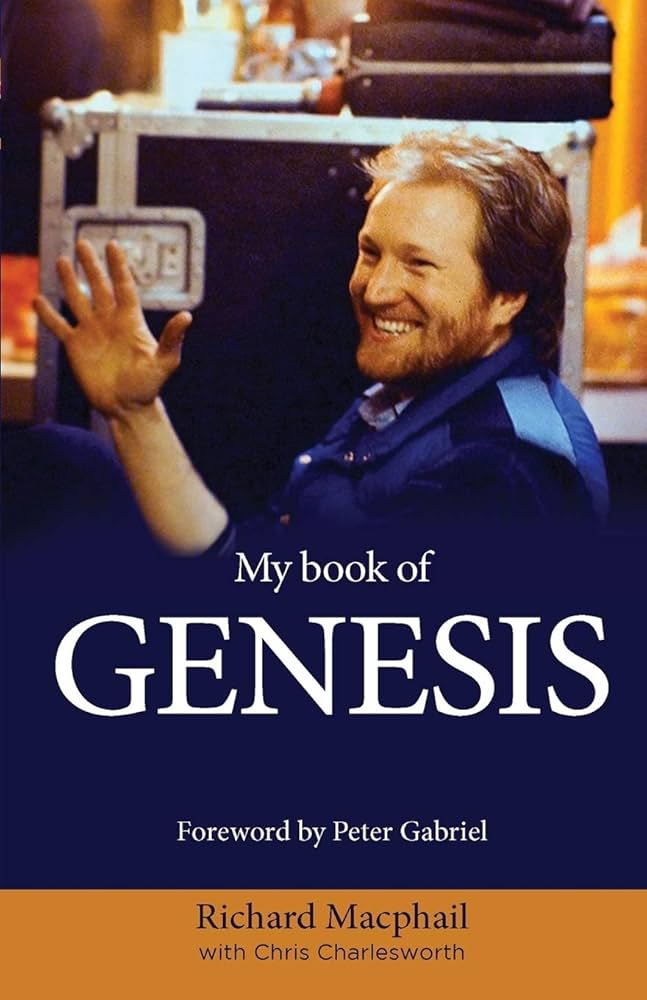
Source
Anthony Phillips’s last gig with Genesis
On 18 July 1970, Genesis played their last show with founding member and guitarist Anthony Phillips at Haywards Heath.
Charterhouse and ‘The Anon’
Anthony Phillips joined Charterhouse, a public school in Godalming, Surrey, in April 1965. Being a guitarist, he quickly formed a band there with his fellow pupils Richard MacPhail, Rivers Jobe, Rob Tyrell and Mike Rutherford. They named themselves Anon and played songs by The Rolling Stones1, The Beatles and several other pop groups of the era. They performed mostly at parties.
The first member to bring in an own song into Anon was Anthony Phillips: ‘Pennsylvania Flickhouse’. They booked an hour of studio time at Tony Pike’s studio in Putney, as Richard MacPhail remembers: ‘We piled all the gear in Ant’s mother’s Mercedes and got on a bus and I thought ‘An hour, on my God, what are we gonna do with a whole hour? Each song’s three minutes long, that means we’re gonna get about nine songs done.’ We just got one done and we had huge rails with Mr Pike because everything was of course too loud and he said ‘You’re gonna ruin my equipment!’, all that classic stuff that went on in those days in recording studios.’2
In December 1966, the group disbanded.
Anthony Phillips in Genesis
In 1967, Ant and his friend and fellow guitarist Mike Rutherford began writing music together. To record a demo, they asked another Charterhouse pupil, Tony Banks, if he could play organ on a song. Tony agreed under the condition that his mate Peter Gabriel could also come along and sing one of their songs. Both of them had also played in a band at Charterhouse, The Garden Wall. Ant and Mike agreed and soon, former Garden Wall drummer Chris Stewart joined the group.
The demo tape was given to producer Jonathan King, who signed them to his publishing company and they recorded some singles. King then named the group Genesis, and the group recorded their first studio album From Genesis to Revelation (1969). Like on the singles, King added strings arranged by Arthur Greenslade to the mix. To their frustration, the band only found out about the strings when listening to the finished version of From Genesis To Revelation with only Ant Phillips showing his anger by storming out of the studio.
By mid-1969, the boys’ parents wanted them to resume education. At Charterhouse, Ant began studying for further A levels to pursue a university degree. But Ant and Mike had been gripped by rock and roll and decided to become professional musicians. By the end of the summer of 1969, Peter and Tony joined them in their wish to become full-time musicians. They began writing music and touring the country from late 1969 to early 1970. ‘Yet, something was lacking‘, it is said in the press kit of Ant’s first solo album, ‘Phillips, perhaps because he was younger than the others found that life on the road was getting in the way of his writing.’3
The unhappiness and the stress began affecting Ant’s health and also he began suffering from stage fright: : ‘I was in Watford Tech, I remember playing the opening thing of ‘Let Us Now Make Love’ and I looked at the guitar and I thought ‘I haven’t got a clue what comes next’ and then I saw myself playing, but it was really scary.’4 Rich MacPhail remembers him playing a gig at Hackney where Ant was almost catatonic.5
Ant battled with the stage fright for three months thinking it was a passing phase and then fell ill with bronchial pneumonia: ‘Doctors were advising me to leave [the band]6‘, Ant says.
In June 1970, Genesis recorded their second album Trespass. Ant enjoyed working in the studio, but in July, they went straight back into band-life with little sleep, a lot of excitement and although Richard MacPhail tried his best to nourish his mates, pretty basic food. They were travelling and sleeping in their bread van or on floors: ‘We literally pitched up somewhere in the Midlands and we had nowhere to stay’, Ant recalls. ‘Too far to go back and some guy said: ‘Well, I know a guy with a bloody big house in Buxton’ and we stayed on the drafted floor of a bloody big house in Buxton.’7
Anthony Phillips leaves the band
Finally, Ant decided to leave Genesis. ‘I remember driving out with with Richard MacPhail who said ‘Can we have a word with you?”, Mike Rutherford remembers. ‘To the pitch at Richmond rugby ground after a soundcheck. Light was falling, it was a weird atmosphere and Ant said he wanted to leave. It was a huge shock to me.’8 Ant’s last show was at Haywards Heath on 18 July 1970.
Tony Banks says: ‘I thought it was the end of the group. He was vital to its formation and in many ways he was the strongest member. We felt that whatever was special about us was a combination of the four of us being together in the same room so I assumed that when he left, that was it.’9
Losing Ant ‘was the closest we came to busting up’, Mike Rutherford agrees. ‘For some reason we felt so close that if one left, we thought we couldn’t carry on. Of all the changes we’ve been through, surviving Ant leaving was the hardest.’10
The aftermath
After Ant’s departure, Genesis did not disband, but his influence remained. The acoustic beginning of the ‘The Musical Box’, the opening song of their next album Nursery Cryme, was based on an instrumental guitar piece by Mike and Ant called ‘F Sharp’.
Ant himself went into a hiatus. ‘I left Genesis in a cloud of dust’, he says. ‘I remember I was listening to Sibelius when I had one those strange revelations – that I was terribly limited.’11 He started studying various musical styles and in 1974, he began teaching music as a means to further explore the subject. In 1977 he said: ‘In the time since I left Genesis, I’ve studied classical guitar, piano, orchestration.’12 That same year he released his first solo album The Geese And The Ghost. Anthony Phillips is still active as a musician today.
Title photo: Cover of one of the various editions of From Genesis to Revelation
Footnotes
- To this day, Ant sends Christmas cards to Richard addressed to ‘Mick Phail’. ↩︎
- RICHARD MACPHAIL INTERVIEW Revised : GENESIS early years ↩︎
- “The Geese and The Ghost Press Kit“. Passport Records. 1977. pp. 2–3. ↩︎
- ANTHONY PHILLIPS UNFILTERED: GENESIS C0-FOUNDER IN CONVERSATION ↩︎
- RICHARD MACPHAIL INTERVIEW Revised : GENESIS early years. In fact, Anthony Phillips has not played live to this day. ↩︎
- Cherry Red Interview: Anthony Phillips Story – Part 1 – Interview by Mark Powell – 2014 ↩︎
- ANTHONY PHILLIPS UNFILTERED: GENESIS C0-FOUNDER IN CONVERSATION ↩︎
- MIKE RUTHERFORD UNFILTERED: GENESIS GUITARIST/COMPOSER IN CONVERSATION. Now Revised ↩︎
- Bowler, Dave; Dray, Bryan, Genesis. A biography. (London: Sidgwick & Jackson, 1992), p. 35. ↩︎
- Ibid. ↩︎
- Hedges, Dan, ‘It’s that candour moment…’, Sounds (26 March 1977). ↩︎
- Ibid. ↩︎
Genesis (1983) – Genesis
On 3 October 1983, Genesis released their self-titled album Genesis.
Continue reading “Genesis (1983) – Genesis”Six Of The Best
On October 2, 1982, the legendary ‘Six Of The Best’ reunion show with Peter Gabriel and Genesis took place at Milton Keynes.
Continue reading “Six Of The Best”Dublin, 28 September 1972: Peter Gabriel steps onstage in a fox head and red dress
On 28 September 1972, Genesis singer Peter Gabriel shocked both his bandmates and the audience in Dublin when he appeared during The Musical Box wearing a fox’s head and a long red dress, the same striking image that would grace the cover of Foxtrot.
Continue reading “Dublin, 28 September 1972: Peter Gabriel steps onstage in a fox head and red dress”Phil Collins’ Last Gig with Genesis at Cowdray Ruins, 18 September 1993
On 18 September 1993, Genesis gave what would turn out to be Phil Collins’ final live performance with the band: an understated charity concert at the historic Cowdray Ruins in Sussex.
Genesis in 1993
1993 was a relatively quiet year for Genesis. Following their massive We Can’t Dance tour in 1992, the members returned to their solo projects. For Phil Collins, it was a turbulent time. His marriage to his second wife, Jill, was breaking down under heavy tabloid scrutiny, and he poured much of that emotion into his solo album Both Sides. Dark, angry, and intensely personal, the album divided critics, something that weighed heavily on him.
Against this backdrop, Genesis regrouped briefly for a one-off charity concert at Cowdray Ruins. The show raised funds for the King Edward VII Hospice and featured an extraordinary lineup, including Pink Floyd and the surviving members of Queen.
A unique Genesis lineup
That night, Genesis appeared without their regular touring partners Chester Thompson and Daryl Stuermer. Instead, the drums were handled by Roger Taylor (Queen) and Gary Wallis (Mike + The Mechanics), while Tim Renwick (Pink Floyd, Mike + The Mechanics) filled in on guitar and bass.
Genesis performed a short set including “Turn It On Again,” “Hold On My Heart,” “I Can’t Dance,” and a “Tonight, Tonight, Tonight / Invisible Touch” medley. Some sources claim they also played Collins’ solo track “That’s Just the Way It Is,” though this remains doubtful.
Next, Pink Floyd took the stage, with Paul Young (Mike + The Mechanics) providing vocals on some numbers and Mike Rutherford stepping in on bass. Eric Clapton also performed a short set with Mike on bass, before the night ended with the “All Star Cowdray Ruins Band,” featuring nearly everyone involved, running through “Ain’t That Peculiar,” “Can I Get a Witness,” and “Gimme Some Lovin’.”
Low-quality recordings of the event survive on YouTube, but unfortunately no professional release exists, something of a shame, given its historical importance.
Phil’s reflections
Although successful, the concert was modest in scale. Few realized it marked the end of Collins’ 18-year run fronting Genesis. For Phil, the show highlighted his growing distance from the band:
“In the middle of my writing and making BOTH SIDES, Genesis did a concert with Queen. […] But I didn’t enjoy it … As I was singing these songs, it didn’t feel natural. Obviously, it was bad timing, going just like that from doing my most personal thing to a Genesis thing and back. But it definitely felt like ‘What am I doing here?’, like shoes that don’t fit anymore.“1
Though he wouldn’t announce his departure until 1996, the seeds had been sown that evening.
The Cowdray Ruins line-up (as listed in the program):
- Tony Banks – Genesis (keyboards)
- Eric Clapton – guitar
- Phil Collins – Genesis (vocals)
- John Deacon – Queen (bass)
- David Gilmour – Pink Floyd (guitar)
- Adrian Lee – Mike + The Mechanics (keyboards)
- Nick Mason – Pink Floyd (drums)
- Tim Renwick – Mike + The Mechanics / Pink Floyd (bass, guitar)
- Mike Rutherford – Genesis (guitar, bass)
- Roger Taylor – Queen (vocals, drums)
- Garry Wallis – drums
- Richard Wright – Pink Floyd (keyboards)
- Paul Young – Mike + The Mechanics (vocals)
Phil’s departure was still a few years away from being official. But looking back, Cowdray Ruins was the true closing chapter of his time with Genesis.
Sources
Hewitt, Alan (2000): Opening The Musical Box. London: Firefly Publishing.
Platts, Robin (2007): Genesis. Behind the lines, 1967-2007. Burlington, Ont., Canada: Collectors Guide Pub.
Thompson, Dave (2005): Turn it on again. Peter Gabriel, Phil Collins & Genesis. San Francisco: Backbeat Books.
- in Platts 2007: 140 ↩︎


